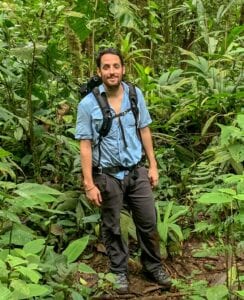Home » stewardship » Failures In Rainforest Conservation Efforts We Must Learn From!

As the developing world intends to indefinitely increase, we are losing our natural forests in the tropics at a rapid rate. From Asia (Indonesia, Philippines, Thailand), Africa (Ivory Coast, Cameroon), and Latin America (Colombia) extensive deforestation has taken place and the forest loss rates vary significantly across these different countries (1).
So why should we care?
i.
Tropical forests contain much of the world’s biodiversity. It has been suggested that wet tropical forests provide far more species than their temperate counterparts. So much so, they account for ⅔ of the earth’s 14 MILLION species (2).
ii.
Tropical forests represent a vast store of sequestered carbon. When this carbon is released, it contributes to climate
change.
iii.
Tropical forests are essential for forest dwellers and many rural people alike, who massively depend on access to forest services for their survival.
Although many attempts in conserving our tropical rainforests seem optimistic, it would be foolish of us to ignore the fact that there have been many failures in such endeavors. Here are some of the failures we must learn from if we are to save this critical, biodiverse ecosystem.
COSTS: Although forest conservation and sustainable natural forest management carry along with the many benefits, they also come at a considerable cost. These costs include the use of alternative forms of land use, such as wildlife invading adjacent agricultural fields or negative hydrological impacts by competing for water with other land uses (3).
PLANTATIONS: while we are experiencing the gradual disappearance of such forests, there is an expansion in plantation areas elsewhere. However, these plantations are far from matching the rate at which we are losing forests. It is suggested that there is a slow trend towards the payments for ecological services despite the fact that these services could tackle the market failure problem directly by being efficient and cost-effective (3).
NORTH FREE RIDE (View Map of North and South): ViewForest conservation expenditures have increased considerably since the 1970s (the total amount involved in the 1990s amounted to some $2 billion – or an average of $200 million per year). However, this isn’t a representation of equal input by all. Some parties in the North have adapted the “free
ride” on conservation in the south. This is unfair, inefficient, and unsustainable. The evidence lies in the fact that the
north is unwilling to pay for sustainably produced tropical timber, or biodiversity-friendly shade-grown coffee from forest regions. None of this is surprising given the public good nature of most forest services (3).

POORLY RUN STATE PROPERTY REGIMES: It is now generally agreed that pure state property regimes have performed very poorly in the past and that it is impossible in a developing country context to simply protect the forest from the local people depending on them for their livelihood. The move towards devolution and the participation of local people in forest management is undoubtedly a move in the right direction. However, common or private property regimes are not without serious problems and risks (3).
SCALE OF OUR ACTIONS: Actions at one scale alone, whether global or local, is insufficient. ‘Grand design’ solutions such as logging bans, timber boycotts, and protected areas that exclude local communities have been shown to not work. It has been suggested that a ‘muddle through’ approach is needed (4). Success in conserving and managing forests depends upon governance mechanisms whereby they are transparent, participatory and accountable. We need to evaluate the effectiveness at multiple scales: local, regional, national and international. Governments don’t have all the solutions in hand and public engagement is vital in order to conserve and manage.
HOW TO IMPROVE: Feedback loops are vital. For example, the Amazon rainforest in Brazil in 2004 reduced their deforestation by 70%! This gives us great optimism for the future ahead. Most current forest policy efforts do not have a connection between international, national, regional, and local scales. This, in turn, leads to poorly designed solutions at any scale (3).
A SUCCESS STORY – PURCHASING LAND FOR CONSERVATION
Where: South Africa’s Soutpansberg mountain range.
Wildlife: An extraordinary variety of essential and unique habitat types. Resident species reflect that diversity, ranging from small endemic species to large, wide-ranging predators, like the Vulnerable Leopard.
Issues: Wildlife poaching, agricultural expansion, and sand-mining threaten the future of the region’s ecosystem.
Strategic Land Purchase Provides Vital Corridor to Save Wildlife in South Africa
“Our strategy is to protect expansive mountain range habitat and curb the poaching of precious wildlife” – Rainforest Trust’s Africa Conservation Officer Katie Pugh (5).
The Endangered Wildlife Trust purchased a vital part of the land (3,298-acre property) in South Africa’s Soutpansberg mountain range, taking an essential step towards connecting a network of reserves in a unique and biodiverse landscape. This project also engages local landowners to combat the poaching of leopards and other threatened species. They suggest that by connecting this property to other important biodiversity sites is critical to bolstering protection for a wide range of threatened and endemic species. However, there is room for improvement as they intend on covering over 60,000 acres of intact habitat! The Endangered Wildlife Trusts (EWT) Soutpansberg Protected Area (SPA) manager Oldrich van Schalkwyk, said the reserve “will work with existing landowners and local communities to make one large protected area with the aim of saving species and habitats, providing critical ecosystem services, such as clean water, and developing climate change resilience.”

Founder of Grow Jungles